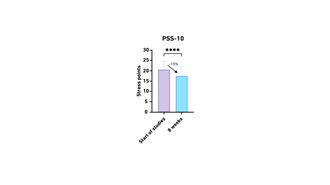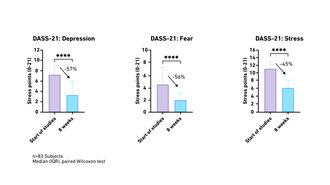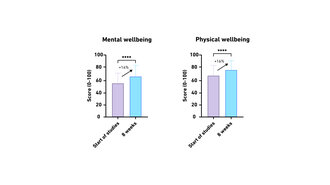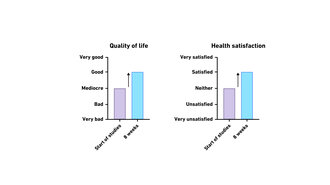8 weeks of BIOGENA Antistress Formula® reduce feelings of stress and improve quality of life


Stress & health
The topic of stress is omnipresent. However, stress is not necessarily a bad thing. It helps us to act quickly and overcome challenges. However, it becomes critical when this brief state of alertness becomes permanent, as this can have negative effects on our mental and physical health (1).
In a recent Austrian study, 70% of respondents said they were often or very often stressed (2). The effects of persistently high stress levels are often complex: irritability and sleep disorders frequently occur, as do concentration difficulties, feelings of being overwhelmed and exhaustion, even burnout (1,2). However, stress not only affects our mental well-being, but also our physical health: digestive disorders, skin problems, a weakened immune system, muscle pain and cardiovascular diseases are among the possible consequences of severe stress (1, 2).
A range of strategies can help to manage stress: conscious relaxation, regular breaks and exercise help to reduce tension and promote regeneration. It is equally important to provide the body with reliable nutrients during challenging times: on the one hand, the need for nutrients often increases under stress, and on the other hand, studies show that selected micronutrients and herbal active ingredients can have a positive effect on the subjective perception of stress – and thus offer valuable support in everyday life (3-5).
Stress & micronutrients
Studies show that a good supply of vitamins and minerals supports both cognitive functions and an appropriate stress response. B vitamins are a particular focus: several studies link their intake with less subjective stress, lower fatigue and improved mood – which is plausible, as B vitamins act as cofactors in cellular energy production (ATP) and are involved in the formation and regeneration of nerve cells (6,7).
Magnesium also plays a central role: stress can increase magnesium requirements, creating a vicious circle of stress and magnesium deficiency. Targeted supplementation, especially in combination with vitamin B6, has been linked in studies to better stress management and lower PSS scores (8).
Herbal adaptogens such as ashwagandha and ginseng are known for their balancing effects. They probably work by modulating the stress axis, the so-called hypothalamic-pituitary-adrenal axis (HPA axis); additional GABAergic effects have been described for ashwagandha. Studies show that standardised ashwagandha extracts can reduce stress levels, anxiety levels and, in some cases, cortisol; there is also evidence that ginseng improves emotional parameters during stressful periods. In a double-blind, placebo-controlled study, a standardised ginseng preparation reduced subjectively perceived stress (measured using the Perceived Stress Scale (PSS)) and also showed benefits in cognitive tasks (9-11).
Observational study with BIOGENA Antistress Formula®
BIOGENA Antistress Formula® combines all eight B vitamins, magnesium and ginseng extract – nutrients and plant-based active ingredients that have been linked in clinical studies to better stress management (e.g. lower PSS values) and improved mood and cognition (6–11). The formula thus combines evidence-based components with great potential for supporting stress regulation.
In the BIOGENA observational study, 84 people were monitored over eight weeks. They took one capsule of BIOGENA Antistress Formula® daily without making any other changes to their lifestyle. At the beginning and end of the study, the subjective stress perception (PSS-10), psychological distress in the dimensions of anxiety, depression and stress (DASS-21), as well as the psychological and physical domains of well-being and quality of life & health satisfaction (WHOQOL-BREF) were recorded.
Results at a glance
- Subjective stress perception (PSS-10): significant reduction (−15 %)
- Mental stress (DASS-21): marked decreases in depression (−57 %), anxiety (−56 %) and stress (−45 %)
- Well-being (WHOQOL-BREF): clear increase in psychological (+14%) and physical (+16%) well-being
- Quality of life & health satisfaction: increase from ‘neutral’ to ‘good’ in self-assessments
Reduction in subjective stress perception (PSS-10)
After eight weeks of taking BIOGENA Antistress Formula®, consistently positive changes were observed: subjective stress perception, measured using the Perceived Stress Scale (PSS-10), fell significantly by 15%.
The PSS-10 measures how stressful everyday life has been in recent weeks – i.e. not ‘objective’ stress, but the individual perception of, for example, unpredictability, excessive demands and loss of control. It comprises ten statements that are rated from 0 (“never”) to 4 (‘very often’); higher values indicate more perceived stress. A reduction of 15% suggests that participants felt calmer, more relaxed and more capable of acting at the end of the study.

The figure shows the change in subjective stress levels among the 84 participants, measured on the PSS-10 scale, before and after taking BIOGENA Antistress Formula® for eight weeks. Mean values with standard deviation (mean ± SD) are shown. Normal distribution was tested using the Shapiro–Wilk test. The significance of the pre–post differences was tested using the paired t-test.
Decrease in psychological stress (DASS-21)
Psychological stress also decreased noticeably: measured with the DASS-21 (Depression, Anxiety, Stress Scales), the three subscales showed significant decreases – depression −57%, anxiety −56% and stress −45%. This reduced not only acute tension, but also aspects associated with brooding, worry and depressed mood.
The DASS-21 measures stress levels over the past week in the areas of depression, anxiety and stress. It is not a diagnostic tool, but rather a screening tool for assessing negative emotions. Higher values indicate greater stress (maximum value per subscale: 21). The fact that all three areas decreased significantly indicates a broad, everyday reduction in stress.

The figure shows the results of the DASS-21 questionnaire completed by the 84 participants at two measurement points (start of study vs. 8 weeks). Median values with IQR (error bars) are shown. Normal distribution was tested using the Shapiro–Wilk test. The significance of the pre–post differences was tested using the paired Wilcoxon test.
Significant improvement in quality of life (WHOQOL-BREF)
Parallel to the decrease in stress levels and psychological strain, quality of life improved, as measured by the WHOQOL-BREF. Psychological well-being increased by 14% and physical well-being by 16%. Overall, self-assessment shifted from ‘neutral’ to ‘good’ in terms of both overall quality of life and satisfaction with one's own health.
The WHOQOL-BREF is an internationally established instrument of the WHO. It maps several domains of quality of life (including physical and psychological); the results are usually converted to a 0–100 scale, with higher values indicating better well-being. The observed increases suggest that participants felt more productive, balanced and generally more satisfied.


The figures show the changes in psychological and physical well-being as well as quality of life and health satisfaction (WHOQOL-BREF) before and after eight weeks of taking BIOGENA Antistress Formula®. Median values with interquartile range (IQR; error bars) are shown. Normal distribution was tested using the Shapiro–Wilk test. Pre-post differences were tested using the paired Wilcoxon test.
Bottom Line
Eight weeks of taking BIOGENA Antistress Formula® led to less perceived stress (PSS-10), lower levels of anxiety, depression and tension (DASS-21) and a noticeable improvement in quality of life (WHOQOL-BREF). The results are consistent with the scientific literature (4-11) and support the supportive role of B vitamins, magnesium and ginseng in stress management – with measurably lower stress levels and a higher quality of life.
Bibliography
(1) Agorastos, A., & Chrousos, G. P. (2022). The neuroendocrinology of stress: The stress-related continuum of chronic disease development. Molecular Psychiatry, 27, 502–513. https://doi.org/10.1038/s41380-021-01224-9
(2) Mavie. (2025, 18. September). Stress Studie: 70 % der Österreicher:innen sind (sehr) oft gestresst [Pressemitteilung]. OTS.at. Zugriff am 15. Oktober 2025, von https://www.ots.at/presseaussendung/OTM_20250918_OTM0027/stress-studie-70-der-oesterreicherinnen-sind-sehr-oft-gestresst
(3) Richardson, K. M., & Rothstein, H. R. (2008). Effects of occupational stress management intervention programs: A meta-analysis. Journal of Occupational Health Psychology, 13(1), 69–93. https://activityinsight.pace.edu/krichardson/intellcont/Richardson%20JOHP%202008-1.pdf
(4) Lopresti, A., L. (2020). The Effects of Psychological and Environmental Stress on Micronutrient Concentrations in the Body: A Review of the Evidence. Adv Nutr 2020;11:103–112. https://doi.org/10.1093/advances/nmz082. https://pubmed.ncbi.nlm.nih.gov/31504084/
(5) Long, S. & Benton, D. (2013). Effects of Vitamin and Mineral Supplementation on Stress, Mild Psychiatric Symptoms, and Mood in Nonclinical Samples: A Meta-Analysis. Psychosom Med. Feb;75(2):144-53. doi: 10.1097/PSY.0b013e31827d5fbd. https://pubmed.ncbi.nlm.nih.gov/23362497/
(6) Young, L. M., Pipingas, A., White, D. J., Gauci, S., & Scholey, A. (2019). A Systematic Review and Meta-Analysis of B Vitamin Supplementation on Depressive Symptoms, Anxiety, and Stress: Effects on Healthy and ‘At-Risk’ Individuals. Nutrients, 11(9), 2232. https://doi.org/10.3390/nu11092232 https://pubmed.ncbi.nlm.nih.gov/31527485/
(7) Calderón-Ospina, C. A., & Nava-Mesa, M. O. (2020). B vitamins in the nervous system: Current knowledge of the biochemical modes of action and synergies of thiamine, pyridoxine, and cobalamin. CNS Neuroscience & Therapeutics, 26(1), 5–13. https://doi.org/10.1111/cns.13207 https://pubmed.ncbi.nlm.nih.gov/31490017/
(8) Pouteau, E., Kabir-Ahmadi, M., Noah, L., et al. (2018). Superiority of magnesium and vitamin B6 over magnesium alone on severe stress in healthy adults with low magnesemia: A randomized, single-blind clinical trial. PLOS ONE, 13(12), e0208454. https://doi.org/10.1371/journal.pone.0208454
(9) Pandit, S., Srivastav, A. K., Sur, T. K., Chaudhuri, S., Wang, Y., & Biswas, T. K. (2024). Effects of Withania somnifera Extract in Chronically Stressed Adults: A Randomized Controlled Trial. Nutrients, 16(9), 1293. https://doi.org/10.3390/nu16091293 https://pubmed.ncbi.nlm.nih.gov/38732539/
(10) Dormal, V., Jonniaux, L., Buchet, M., Simar, L., Copine, S., & Deldicque, L. (2025). Effect of Hydroponically Grown Red Panax Ginseng on Perceived Stress Level, Emotional Processing, and Cognitive Functions in Moderately Stressed Adults: A Randomized, Double-Blind, Placebo-Controlled Study. Nutrients, 17(6), 955. https://doi.org/10.3390/nu17060955 https://pubmed.ncbi.nlm.nih.gov/40289951/
(11) Panossian, A., & Wikman, G. (2010). Effects of Adaptogens on the Central Nervous System and the Molecular Mechanisms Associated with Their Stress—Protective Activity. Pharmaceuticals, 3(1), 188-224. https://doi.org/10.3390/ph3010188








